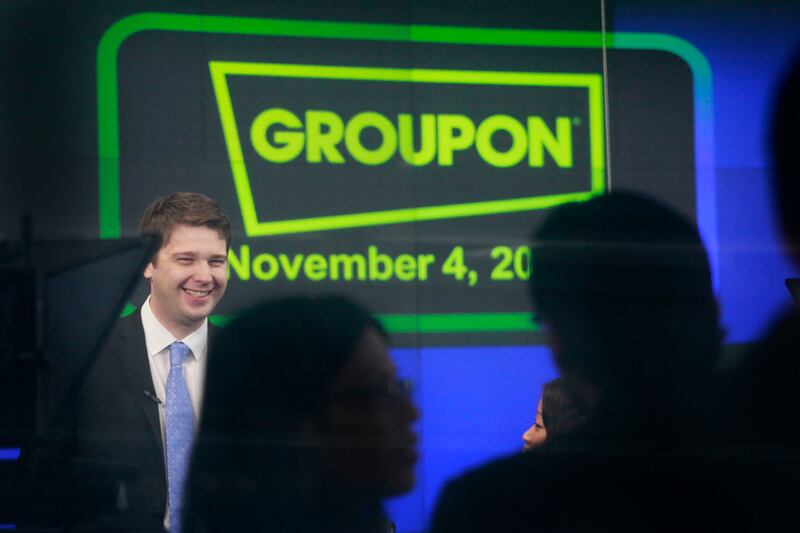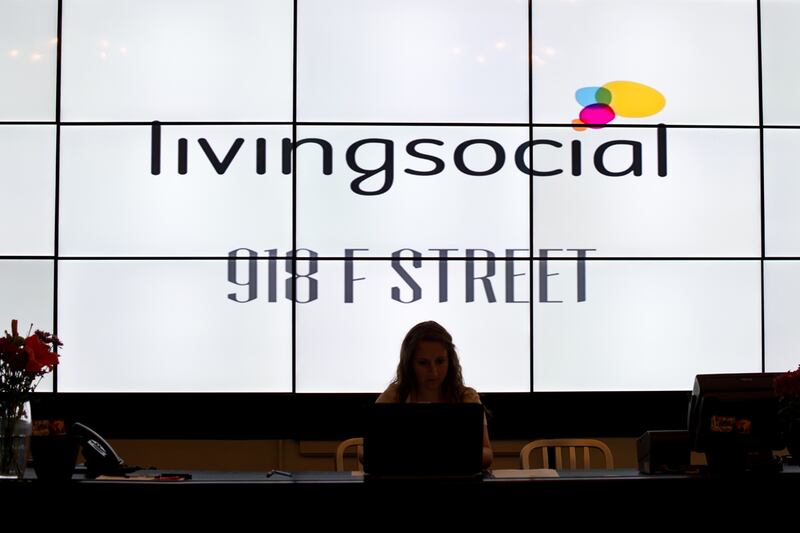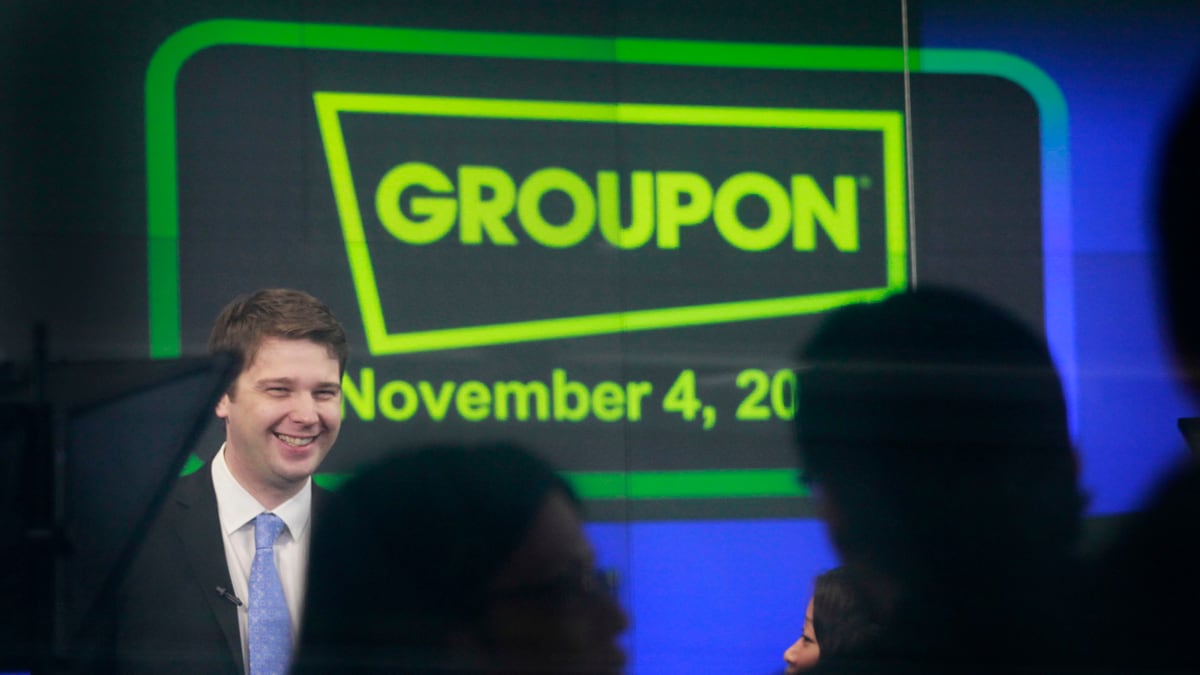The U.S. economy is growing, ever fitfully and disappointingly. That’s good for business, unless your business happens to be one of the latest tech fads: the daily deal. The travails of the largest and most prominent daily-deal purveyor, the Chicago-based Groupon, are well known: its declining stock price, a history of questionable accounting, and a founder/CEO whose tenure is in question. But Groupon is buffeted by a problem that it and its competitors all face: the daily-deal business just isn’t that great.
Although there are hundreds of companies offering online group-bought deals, the two most prominent are Living Social and Groupon. Living Social, based in D.C., confirmed Thursday that it would be lay off 400 employees, or 10 percent of its total workforce. The “good news” for Groupon this week was that its stock jumped after CEO Andrew Mason said at a conference that “If I ever thought I wasn't the right guy for the job, I'd be the first person to fire myself." Groupon’s board Thursday confirmed that Mason would be staying on as CEO. Groupon, which was declared by Forbes in August of 2010 to be “the fastest-growing company ever,” now trades at about $4.50—less than a quarter of its $20 IPO price.
Living Social is privately held. But a look at Groupon’s financials gives us insight into just what these companies are up against. Groupon is a tale of three numbers that, when presented in sequence, decline in large magnitude. The first is its gross billings, the revenue it reaps from sales before it pays out refunds to the merchant or taxes, which came in at $1.2 billion in the third quarter. The second is revenue, about three quarters of which comes from the group sales and a quarter of which comes from goods the company sells directly. That was $569 million in the third quarter. The third number is the company’s net loss: about $3 million for the third quarter.
In the beginning of 2011, Groupon’s gross billings of $668 million were growing by over 1,400 percent year over year; but in the third quarter of 2012, the $1.2 billion in billings today represented a mere 5 percent annual increase. In that same time period, the number of customers who had purchased a Groupon in the previous year rose from 15.4 million to just under 40 million. But the gross billing per customer had fallen by just under 12 percent, from $169 to $149. The year-on-year growth rate of the company’s quarterly revenues has slumped from 1,358 percent in early to 2011 to 33 percent in the third quarter.

What’s more, it is costing Groupon more in marketing and sales (you need salespeople on the ground to get merchants to participate in deals) to get fewer dollars from each customer. The company’s workforce has been shrinking too. Groupon let 954 workers go in the third quarter and laid off 80 more earlier this month when it announced its earnings. Groupon has just above 11,000 employees).
Living Social’s financials are more opaque, but because Amazon put $175 million into the company in December 2010, we are able to glean some data. Amazon disclosed that Living Social lost $566 million in the third quarter, although most of those losses were chalked up to accounting items.
Both companies are likely suffering from a few fundamental problems. David Reibstein, a marketing professor at the Wharton School at University of Pennsylvania, was an early daily-deal skeptic. In May 2011 he argued that the business would eventually suffer because merchants would realize that the coupons aren’t a great deal for them. Reibstein argued that Groupon’s customers were likely “price-sensitive,” meaning they search for the best deal they can find. This means that they are not likely to turn into repeat customers. So the merchants offer a deal, sometimes at a loss, but then get little future business.
This effect has been confirmed empirically by a team of marketing researchers who tracked three businesses for a year after they offered a social coupon. All three companies lost money the month they offered the coupon and will have difficulty earning it back. According to analysis done by the two researchers, V. Kumar and Bharath Rajan, the companies would need 15, 18, and 98 months (almost eight years) to earn back their lost profits. The reason? “The three businesses had difficulty retaining most of the new customers who were attracted to the coupon offers,” the two researchers wrote in the MIT Sloan Management Review.

To compound this problem, merchants can alienate their existing customers by offering coupons. Take the oft-offered massage or spa treatment. Longstanding customers might feel alienated, insulted, or ripped off if a massage they pay $100 regularly is offered for only $50 to a newcomer. Reibstein told The Daily Beast that “nothing irritates people more than finding that they’re paying a premium over what other people are paying.” Even those customers who were perfectly willing to pay the full $100 price for a massage could get a Groupon instead, making the spa take a loss on a customer who was willing to pay full freight. “The last group you want to offer coupons to are your existing customers“ Reibstein says.
Furthermore, Reibstein speculated that Groupon and its ilk would only do well in a weak economy, “The Groupon business model works better during a recession than it does during a vibrant economy,” he said in an interview last year. Although the economy wasn’t technically in recession then, his argument still applies: when a business has extra inventory—say, a beauty salon with unfilled appointments—it will be more willing to discount heavily. But when there’s more demand, higher-quality businesses won’t see the need to offer discounts. As a result, the daily-deal companies will have less compelling offers for their customers.
Reibstein flatly predicted, six months after Google offered $6 billion for Groupon and five months before its IPO, that “there's going to be a lot of money lost in some of these investments”. Today, Groupon’s market capitalization is just under $3 billion. Maybe you’ll get an email soon to get some of its stock at a discount. The company’s shareholders might just prefer a massage.






